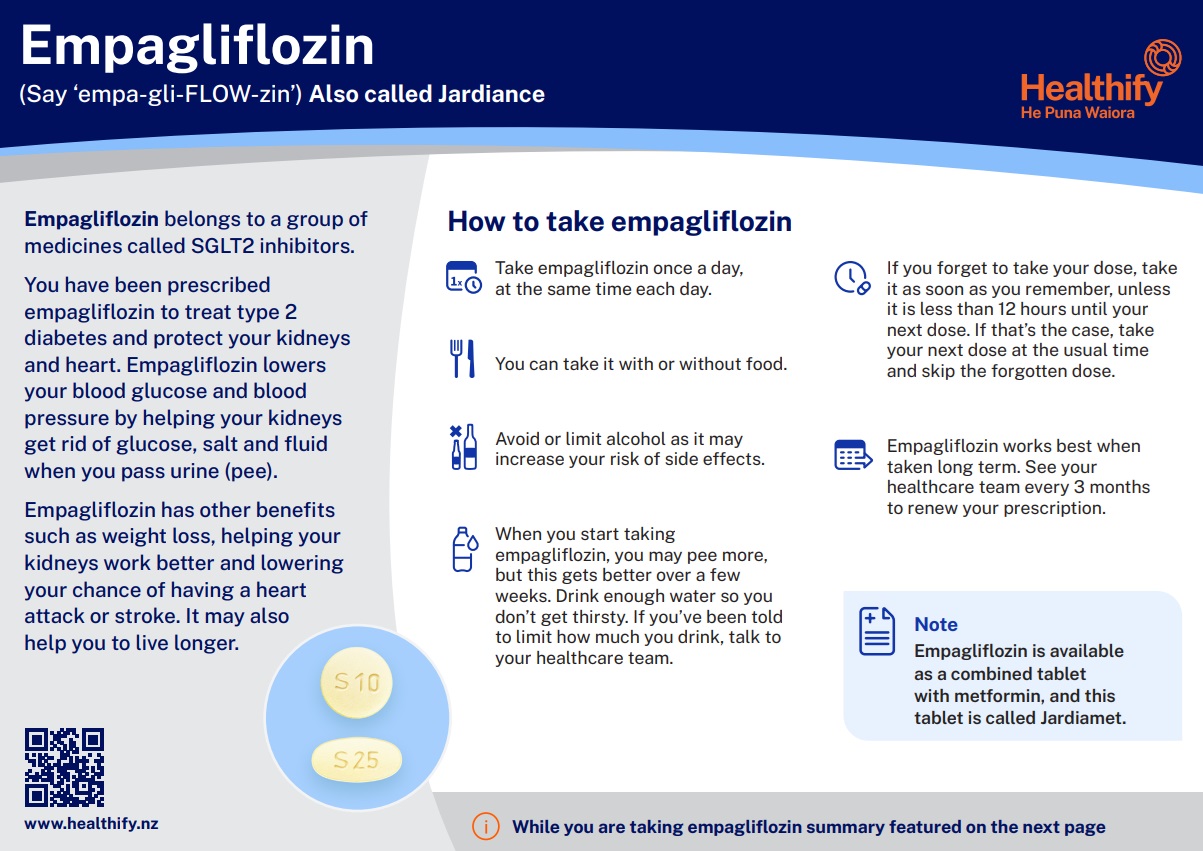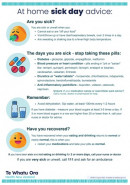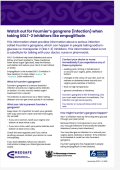You can now add Healthify as a preferred source on Google. Click here to see us when you search Google.
Empagliflozin (also called Jardiance)
Sounds like 'empa-gli-FLOW-zin'
Key points about empagliflozin
- Empagliflozin is used to treat type 2 diabetes and heart failure (along with other medicines).
- Empagliflozin is also called Jardiance.
- Find out how to take it safely and possible side effects.

Empagliflozin is used to treat type 2 diabetes. It lowers your blood glucose by helping your kidneys get rid of glucose when you pass urine (pee/mimi). Empagliflozin is best used together with healthy eating and regular exercise.
Empagliflozin is also used to treat heart failure, along with other medicines. It reduces breathlessness, tiredness, and ankle swelling. It helps to remove excess fluid and salt when you pee. It lowers your chances of hospital admission for heart failure.
Empagliflozin also has other benefits. It can help with weight loss, protects your kidneys and heart, reduces your risk of having a heart attack and lowers blood pressure. It may also help you live longer.
In Aotearoa New Zealand empagliflozin tablets (10 mg and 25 mg) is funded for type 2 diabetes and heart failure, under a Special Authority, for people who meet the criteria. A special authority means your specialist will need to make an application to Pharmac (the government medicine funding agency) for approval before the medicine can be funded for you.
Factsheet: Empagliflozin

Healthify He Puna Waiora, NZ, 2025
Video: Empagliflozin – benefits and side effects (with translated captions)
Video: Empagliflozin – benefits and side effects (NZSL)
In Aotearoa New Zealand empagliflozin is available as tablets (10 mg and 25 mg).
- Always take your empagliflozin exactly as your healthcare provider has told you. The pharmacy label on your medicine will tell you how much to take, how often to take it and any special instructions.
- Diabetes: The usual starting dose is 10 mg once a day. Depending on your blood glucose levels, your healthcare provider may increase your dose to 25 mg once a day.
- Heart Failure: The dose is 10 mg once a day.
- Timing: Take empagliflozin once a day, at the same time each day. Swallow your tablets with a drink of water. You can take empagliflozin with or without food.
- Drink enough water so you don't get thirsty: When you start taking empagliflozin you may pee more, but this gets better over a few weeks. If you’ve been told to limit how much you drink, talk to your healthcare team.
- Avoid or limit alcohol while you are taking empagliflozin: It may affect your blood glucose control and increase your risk of side effects. Drinking alcohol very often or drinking a lot of alcohol over a short time (binge drinking) can affect your blood glucose and lead to high ketone levels. This can cause a serious but rare side effect called ketoacidosis.
- Missed dose: If you forget your dose, take it as soon as you remember that day unless it is 12 hours or less until your next dose is due. If that's the case, skip the forgotten dose and take your next dose at the usual time.
- Don't run out of tablets: Empagliflozin works best when taken every day. Contact your healthcare team every 3 months for a new prescription.
Here are some things to know when you're taking empagliflozin. Other things may be important as well, so ask your healthcare provider what you should know about.
You are at increased risk of urinary tract or fungal genital infection (thrush)
Empagliflozin causes you to pee more and have more glucose in your urine, which increases your risk of getting urinary tract infection (UTI) or thrush (a fungal infection) around the vagina or penis. Germs (bacteria and fungus) like to grow in body fluids with a high sugar content. As your blood glucose level decreases, this tends to settle.
To reduce the risk of infection, wash your genital area (privates) with warm water using non-perfumed soap. Also any drops of pee left behind on your penis or vagina need to be removed.
- People with a vagina should wash their vulval area twice a day. Also, every time after peeing, rinse the area with water and then pat dry with toilet paper. If rinsing isn't possible, just pat dry carefully with toilet paper.
- People with a penis should wash their groin area at least once a day. Also, every time after peeing, rinse your penis with water and then pat dry with toilet paper. If rinsing isn't possible, just pat dry carefully with toilet paper. Pull back your foreskin before you pee, to avoid drops of urine spilling into the foreskin fold.
If you get any of the following symptoms, contact your healthcare provider immediately
- Pain or a burning sensation when peeing.
- The need to pee more often, suddenly or urgently than usual.
- Pee that looks cloudy, dark or has a smell.
- Lower tummy pain or pain in your back, just under your ribs.
- Irritation or itching, pain, redness or swelling in your genital area (privates) or around your bottom.
It's important to treat thrush or UTI early. If left untreated, it can turn into a serious life-threatening infection called Fournier’s gangrene(external link).
Have a sick day plan
If you're unwell, with vomiting, diarrhoea or a fever or you're not eating or drinking as usual, stop taking empagliflozin. Only restart empagliflozin when you are well AND you've been eating and drinking normally for 1 to 2 days.
- Taking empagliflozin when you're unwell increases your risk of high ketone levels, which can cause a serious side effect called ketoacidosis. Ketoacidosis causes your blood to become too acidic and can be very dangerous if it's not treated immediately.
- This advice is the same whether you're taking empagliflozin for diabetes or heart failure.
If you have nausea (feeling sick), vomiting (being sick), pain in your tummy (puku) and feel unwell and confused stop taking empagliflozin, AND go to your GP clinic, after hours medical centre or hospital straight away. You need to have a finger prick blood test immediately to check your ketone levels.
Being dehydrated and not eating enough carbohydrates can cause serious side effects
Being dehydrated and not eating enough carbohydrates can lead to high ketone levels, which can cause a serious but rare side effect called ketoacidosis.
-
Tell your healthcare team before making any big changes to your diet: It's a good idea to cut down on foods with added sugar if you have diabetes. However, having too few carbohydrates in your diet while you're taking empagliflozin may increase your risk of ketoacidosis. Tell your healthcare team if you start eating less, go on a keto (low carbohydrate) diet or if you're fasting. Read more about empagliflozin, fasting and low carbohydrate diets(external link).
- Fasting during Ramadan: If you're fasting during Ramadan and are still getting enough carbohydrates, you can keep taking empagliflozin. It's important to talk to your healthcare provider about getting enough carbohydrates and drinking plenty of water while taking empagliflozin. It's not recommended to start empagliflozin as a new medicine immediately before or during Ramadan.
- Long-distance runners or cyclists: If you're going to run or cycle a long distance while you're taking empagliflozin, it's important to let your healthcare provider know. You may need to stop empagliflozin the day before the event and restart 24 hours or so afterwards when you are well hydrated and eating normally.
- Avoid or limit alcohol. Drinking too much or too often (binge drinking) can cause ketoacidosis.
Prepare before an operation or a procedure
If you are going to have an operation or a procedure where you will need to stop eating for 12 hours or more (eg, a colonoscopy or dental surgery), ask your healthcare team when you should stop and restart your empagliflozin. You may need to stop your empagliflozin 3 days before the operation or procedure.
Are you pregnant, trying for a baby or breastfeeding?
It is important to talk to your healthcare provider as soon as possible if you're trying to get pregnant, are pregnant (hapū) or breastfeeding. You may need to change to another medicine.
Tell your healthcare team if you are taking any other medicines
Empagliflozin may interact with some medicines and herbal supplements, so check with your prescriber or pharmacist before starting empagliflozin and before starting any new medicines or herbal supplements.
Like all medicines empagliflozin can cause side effects, although not everyone gets them. If you're concerned about any symptoms you think might be related to your medicine, talk to your healthcare provider. The following information offers some guidance but doesn't include all possible side effects.
Common side effects
Tell your healthcare provider if these bother you.
- Peeing (urinating) more often than usual.
- Mild skin rash or itchy skin.
- Feeling dizzy. Don't drive or use machinery if you're feeling dizzy. Also, don’t drink alcohol if you are feeling dizzy, as this can increase your risk of falls.
Tell your healthcare provider immediately or phone Healthline free on 0800 611 116 if these occur
- Signs of thrush or urinary tract infection (UTI) such as irritation or itching, pain, swelling or redness in your genital area, or pain or burning feeling when you pee.
- Signs of diabetic ketoacidosis (DKA) such as being sick (vomiting), feeling very thirsty (dehydrated), being confused or unusually tired or sleepy, tummy (abdominal) pain, sweet-smelling breath, deep or fast breathing. You're at increased risk if you are dehydrated or have a sudden illness, drink large amounts of alcohol, have just had surgery, have reduced your calorie intake, are on a low carbohydrate diet or if your insulin requirements have increased.
- Signs of Fournier’s gangrene such as swelling, pain, itching or tenderness in or around your vagina, penis, testicles or bottom, changes to the colour of your skin, such as redness or darkened areas around your vagina, penis, testicles or bottom, fever or high temperature, general feeling of being unwell, or tiredness. Read more about Fournier’s gangrene.(external link)
Read more about medicines and side effects and reporting a reaction that you think might be a side effect.
Resources
|
Empagliflozin factsheets: Find out how to take it safely and the possible side effects. Translations are available in 6 languages.
Some of these translations were funded through a medical education grant provided by Boehringer Ingelheim. Healthify He Puna Waiora retained full editorial control and independence. |
Jardiance(external link) (external link)Medsafe Consumer Information, NZ
Empagliflozin, fasting and low carbohydrate diets(external link) Western Bay of Plenty Primary Health Organization, July 2023
At home sick day advice(external link)(external link)(external link) Health New Zealand | Te Whatu Ora
References
- Empagliflozin(external link) NZ Formulary
- Sweet urine, bitter outcome: Empagliflozin and balanoposthitis(external link) New Zealand Doctor, February 2024
- Reminder – Flozins and the risks of diabetic ketoacidosis and Fournier’s gangrene(external link) Medsafe, NZ, December 2022
- Spotlight on empagliflozin(external link) Medsafe, NZ, December 2020
- Periprocedural diabetic ketoacidosis (DKA) with SGLT2 inhibitor use(external link) NZSSD, 2020
- SGLT2 inhibitors(external link) Type 2 Diabetes Management, NZSSD, 2021
- Position statement on ketogenic or very-low-carbohydrate diets and the use(external link)
of SGLT2-inhibitors in adults with type 2 diabetes(external link) NZSSD, 2021 - Empagliflozin and dulaglutide – your questions answered(external link) He Ako Hiringa, NZ
- Diabetes management during Ramadan(external link) Research Review, NZ, 2023
-
Reminder: risk factors for ketoacidosis with SGLT-2 inhibitors(external link) Medsafe, NZ, December 2024
Brochures


At home sick day advice
Health New Zealand | Te Whatu Ora, 2023

Risk of Fournier’s gangrene infection when taking empagliflozin
Medsafe, November 2022
Credits: Healthify He Puna Waiora Pharmacists. Healthify is brought to you by Health Navigator Charitable Trust.
Reviewed by: Johanna Lim, Clinical Pharmacist – Cardiology Expert. Health New Zealand Te Whatu Ora Te Matau a Māui Hawke’s Bay; Angela Lambie, Pharmacist, Auckland; Claire Salter, Clinical Pharmacist, Tauranga
Last reviewed:
Page last updated:





